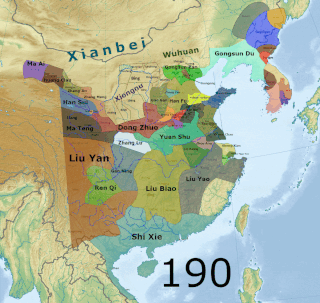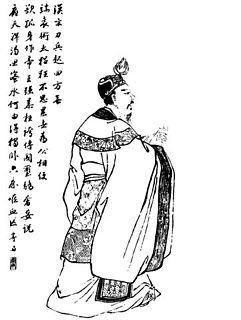Zhang Bu may refer to:
- Zhang Bu (warlord) (died 32), warlord during the Xin–Eastern Han transition
- Zhang Bu (Eastern Wu) (died 264), Eastern Wu general
Zhang Bu may refer to:

The Three Kingdoms from 220 to 280 AD was the tripartite division of China among the states of Wei, Shu, and Wu. The Three Kingdoms period started with the end of the Han dynasty and was followed by the Jin dynasty. The short-lived Yan kingdom in the Liaodong Peninsula, which lasted from 237 to 238, is sometimes considered as a "4th kingdom".

Sun Quan, courtesy name Zhongmou (仲謀), formally known as Emperor Da of Wu, was the founder of the state of Eastern Wu during the Three Kingdoms period. He inherited control of the warlord regime established by his elder brother, Sun Ce, in 200. He declared formal independence and ruled from 222 to 229 as the King of Wu and from 229 to 252 as the Emperor of Wu. Unlike his rivals Cao Cao and Liu Bei, Sun Quan was much younger than they were and governed his state mostly separate of politics and ideology. He is sometimes portrayed as neutral considering he adopted a flexible foreign policy between his two rivals with the goal of pursuing the greatest interests for the country.

Cao Cao, courtesy name Mengde, was a Chinese poet, statesman, and warlord. He was the penultimate grand chancellor of the Eastern Han dynasty who rose to great power in the final years of the dynasty. As one of the central figures of the Three Kingdoms period, he laid the foundations for what was to become the state of Cao Wei and was posthumously honoured as "Emperor Wu of Wei" although he never officially claimed the title Emperor of China or proclaimed himself "Son of Heaven" during his lifetime. He remains a controversial historical figure, and is often portrayed as a cruel and merciless tyrant in subsequent literature; however, he has also been praised as a brilliant ruler, military genius, and great poet with unrivalled charisma who treated his subordinates like his family.

Zhang Liao (169–222), courtesy name Wenyuan, was a Chinese military general serving under the warlord Cao Cao in the late Eastern Han dynasty of China. He served briefly in the state of Cao Wei, founded by Cao Cao's successor Cao Pi, in the early Three Kingdoms period before his death. Formerly a subordinate of other warlords such as Ding Yuan, Dong Zhuo and Lü Bu, Zhang Liao joined Cao Cao around 198 after Lü Bu's downfall at the Battle of Xiapi. Since then, he participated in many of Cao Cao's military campaigns, including those against Yuan Shao's heirs and the Wuhuan tribes from 201 to 207. He is best known for his pivotal role in the Battle of Xiaoyao Ford in 214–215, in which he successfully defended Hefei from the forces of the warlord Sun Quan.

Wu, commonly known as Dong Wu or Sun Wu, was one of the three major states that competed for supremacy over China in the Three Kingdoms period (220–280). It previously existed from 220–222 as a vassal kingdom nominally under Cao Wei, its rival state, but declared independence from Wei and became a sovereign state in 222. It became an empire in 229 after its founding ruler, Sun Quan, declared himself emperor. Its name was derived from the place it was based in — the Jiangnan region, which was also historically known as "Wu". It was referred to as "Dong Wu" or "Sun Wu" by historians to distinguish it from other Chinese historical states with similar names which were also located in that region, such as the Wu state in the Spring and Autumn period and the Wuyue kingdom in the Five Dynasties and Ten Kingdoms period. It was called "Eastern Wu" because it occupied most of eastern China in the Three Kingdoms period, and "Sun Wu" because the family name of its rulers was "Sun". During its existence, Wu's capital was at Jianye, but at times it was also at Wuchang.

Zhang is the third most common surname in mainland China and Taiwan, and it is one of the most common surnames in the world. Zhang is the pinyin romanization of the very common Chinese surname written 张 in simplified characters and 張 in traditional characters. It is spoken in the first tone: Zhāng. It is a surname that exists in many languages and cultures, corresponding to the surname 'Archer' in English for example. In the Wade-Giles system of romanization, it is rendered as Chang, which is commonly used in Taiwan; Cheung is commonly used in Hong Kong as romanization.

Dong Zhuo, courtesy name Zhongying, was a Chinese military general, politician, and warlord who lived in the late Eastern Han dynasty. At the end of the reign of the Eastern Han, Dong Zhuo was a general and powerful minister of the imperial government. Yet he forced the young Emperor Shao of Han to abdicate and replaced him with his half-brother Emperor Xian of Han while he sought to become the de facto ruler of China in the boy-emperor's name. The Eastern Han dynasty regime survived in name only.

Yuan Shu, courtesy name Gonglu, was a Chinese military general, politician, and warlord who lived during the late Eastern Han dynasty. He rose to prominence following the collapse of the Han central government in 189. He declared himself Emperor of China in 197 under the short-lived Zhong dynasty, two years before his death in 199.
Shi Xie (137–226), courtesy name Weiyan, also known by his Vietnamese name Sĩ Nhiếp, was a Chinese military general, politician, and warlord who lived during the Eastern Han dynasty and early Three Kingdoms period of China. He served as the Administrator of Jiaozhi Commandery in present-day northern Vietnam. The third-century historical text Records of the Three Kingdoms (Sanguozhi) is a major source of Chinese traditions concerning Shi Xie's life. He promoted Buddhism throughout his life. After his death, the Vietnamese attached many legends to him and honoured him as King Sĩ in some temples.
Mi Fang, courtesy name Zifang, was a Chinese military general and politician serving under the warlord Liu Bei in the late Eastern Han dynasty. He was also the younger brother of Mi Zhu, who also served Liu Bei. In 219, Mi Fang surrendered to Liu Bei's ally-turned rival Sun Quan, directly resulting in the loss of Jing Province and the death of Guan Yu. The Australian Sinologist Rafe de Crespigny notes that Mi Fang had the remarkable record of serving each of the leaders of the Three Kingdoms during his lifetime.

The end of the Han dynasty refers to the period of Chinese history from 189 to 220 CE, which roughly coincides with the tumultuous reign of the Han dynasty's last ruler, Emperor Xian. During this period, the country was thrown into turmoil by the Yellow Turban Rebellion (184–205). Meanwhile, the Han Empire's institutions were destroyed by the warlord Dong Zhuo and fractured into regional regimes ruled by various warlords, some of whom were nobles and officials of the Han imperial court. Eventually, one of those warlords, Cao Cao, was able to gradually reunify the empire, ostensibly under Emperor Xian's rule, but the empire was actually controlled by Cao Cao himself.

The Warlord Era was a period in the history of the Republic of China when control of the country was divided among former military cliques of the Beiyang Army and other regional factions from 1916 to 1928.

The Campaign against Dong Zhuo was a punitive expedition initiated by a coalition of regional officials and warlords against the warlord Dong Zhuo in 190 in the late Eastern Han dynasty. The members of the coalition claimed that Dong had the intention of usurping the throne by holding Emperor Xian hostage and by establishing a strong influence in the imperial court. They justified their campaign as to remove Dong from power. The campaign led to the evacuation of the capital Luoyang and the shifting of the imperial court to Chang'an. It was a prelude to the end of the Han dynasty and, subsequently, the Three Kingdoms period.
Huan may refer to:
Zhang Wen, courtesy name Boshen, was a Chinese official and military general of the Eastern Han dynasty. Zhang held prime ministerial office during the reign of Emperor Ling of Han, serving as Grand Excellency of Works from 184 to 185 and Grand Commandant from 186 to 187. Zhang oversaw the dynasty's military response to the Liang Province Rebellion from 185 to 186, supervising the future warlords Dong Zhuo and Sun Jian. After Dong seized control of the Eastern Han court in 189 and relocated it from Luoyang to Chang'an, Zhang continued to serve in ministerial office while conspiring against Dong. He was executed in November 191 at Dong's order.
Zhang Xiu may refer to:
Zhang Yang, courtesy name Zhishu, was an official and minor warlord who lived during the late Eastern Han dynasty of China. Originally from Yunzhong Commandery in the north, he eventually became the de facto ruler of Henei Commandery. Although threatened by powerful warlords such as Cao Cao and Yuan Shao, Zhang Yang still provided refuge for Emperor Xian of Han numerous times, eventually attaining the rank of Grand Marshal (大司馬).
Zhang Bu, courtesy name Wengong (文公), was a major warlord in Eastern China during the Xin and early Eastern Han periods. He was from Langya Commandery in Xu Province.
Gu Shao, courtesy name Xiaoze, was an official serving under the warlord Sun Quan in the late Eastern Han dynasty of China.
Liang Wang may refer to: